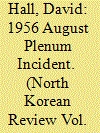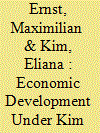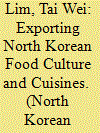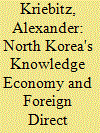|
|
|
Sort Order |
|
|
|
Items / Page
|
|
|
|
|
|
|
| Srl | Item |
| 1 |
ID:
175870


|
|
|
|
|
| Summary/Abstract |
Article Type: Commentary Essay Purpose— This article examines English language historiography surrounding the 1956 august Plenum Incident. It identifies the widely held "traditionalist" and recent "revisionist" views and compares them to assess if the incident really was a "factional" struggle. Approach— This paper identifies and analyzes key secondary sources from the 1950s to the 2010s alongside relevant primary sources to deconstruct and better understand historical understandings of this event. By doing this, this paper can assess if the event was a factional struggle. Findings— Through the analysis of various secondary sources on this event, this paper identifies and explores the dominant "traditionalist" view in scholarship, that this event was indeed a factional struggle. This paper also identifies the recent "revisionist" view, that the incident was a policy dispute over de–Stalinization rather than an attempt to depose Kim Il-sung as North Korea's leader. This article concludes on the side of traditionalism that it was most likely a factional struggle, although it acknowledges that wider access to primary sources will be needed to draw any definitive conclusions. Originality— A careful consideration of both "traditionalist" and "revisionist" arguments, along with relevant primary source material, brings together previous and contemporary understandings of the 1956 august Plenum Incident.
|
|
|
|
|
|
|
|
|
|
|
|
|
|
|
|
| 2 |
ID:
175869


|
|
|
|
|
| Summary/Abstract |
Article Type: Research essay Purpose— This paper asks how often South Koreans think about North Korea and the ramifications of this attention. Design, Methodology, Approach— An original web survey conducted by Macromill Embrain of 1,111 South Korean asks about frequency of thinking about North Korea as well as other demographic and attitudinal questions Findings— Nearly 40% of respondents had not thought of North Korea at all in the past week, compared to roughly 10% that did every day or every other day. Age positively corresponded with frequency, while views on inter–Korean relations, the North's nuclear program and knowing a North Korean refugee also influenced frequency. Practical Implications— The frequency of South Korean thoughts on North Korea sheds light on perceptions of broader issues in inter–Korean relations. Originality, Value— This is the first study of its kind to address the frequency in which the South Korean public thinks about North Korea.
|
|
|
|
|
|
|
|
|
|
|
|
|
|
|
|
| 3 |
ID:
175872


|
|
|
|
|
| Summary/Abstract |
Article Type: Research note Purpose— This article considers the three summits between the U.S. and North Korea, the reasons for the failure of their denuclearization negotiations, and two ideas—a series of mini nuclear deals and the political assassination of North Korean leader—to resolve the nuclear standoff. Design/methodology/approach— The approach is qualitative and expository: it consults area studies, social science, and journalism; it observes past and current geopolitical events and makes informed policy suggestions. Findings— The Hanoi summit between the United States and North Korea ended in failure because the two countries' incompatible demands made reaching a new agreement—not just on North Korea's nuclear program but on anything—almost impossible. Washington called on Pyongyang to unilaterally surrender its entire nuclear weapons program before it would make any concessions, while Pyongyang demanded U.S. economic aid and security guarantees before it would destroy its nuclear programs. Originality/value— The value of this article lies in its explanations of why the first ever two summits between the U.S. and North Korea failed to resolve or even alleviate tensions between these two countries. Every option the U.S. has for dealing with North Korea is bad but accepting it as a nuclear power (mini deals) may be the least bad.
|
|
|
|
|
|
|
|
|
|
|
|
|
|
|
|
| 4 |
ID:
175866


|
|
|
|
|
| Summary/Abstract |
Article Type: Research paper Purpose— The paper reviews various established sources and statistics in the study of North Korea's economy in order to assess the added value of empirically collected data on traffic in North Korea derived from satellite imagery. The collected data are used to evaluate the impact of economic policy directives during Kim Jongun's rule on North Korea's economic development. Design, Methodology, Approach— Source triangulation is applied to create a robust and falsifiable account of North Korea's economic development based on existing and new data sources. Findings— Policy directives by the North Korean government appear to retain limited impact on North Korea's economy. Whereas foreign trade and GDP appear to be profoundly influenced by sanctions, data on construction and the newly introduced traffic data are not in sync with these indicators, as they don't follow the downward trend. Originality Value— Established statistics on GDP growth, foreign trade, marketization, and construction are combined with empirically collected data on traffic, derived from satellite imagery, to inform the study of North Korea's economic development
|
|
|
|
|
|
|
|
|
|
|
|
|
|
|
|
| 5 |
ID:
175871


|
|
|
|
|
| Summary/Abstract |
Article Type: Review Essay Purpose— The purpose of this commentary/review essay is to examine North Korean food culture and cuisine exports (especially to the ethnic Korean border areas on the Chinese side of the Sino–North Korean border) in the context of North Korean external political economy, cultural diplomacy and economic exchanges. Design, Methodology, Approach— This review essay and commentary tries to address gaps in the literature and hopes to provide insights into North Korea's exportation of food culture and cuisine overseas, especially to the autonomous region of Yanbian in China's Jilin province. A caveat is that Korean culture has a deep history of food and culinary culture and only a few selected examples are featured here, contextualized in its commodified form. It does not pretend to be comprehensive in featuring all important dishes. The article is based on interpretive work and multiple secondary sources that are corroborated. Findings— Any form of export is an avenue for the inflow of much-needed foreign currencies for the regime. One hub where North Korean restaurants cluster is at the Yanbian autonomous region of Jilin prefecture in China. The United Nations (UN) sanctions and staff defections have unexpectedly hurt these restaurants' profit margins. Performers at North Korean restaurants are well-trained in the traditional/popular art-forms, have good credentials and party pedigree. Iconic dishes served at the restaurants include dog meat, which is a delicacy in North Korea and, for individuals with a yearning for aristocratic dishes with regal tastes, and want to sample royal food, dishes like sinseollo is served. In terms of beverages, the locally feted Taedonggang North Korean beer has been strangely reproduced by a local brewery in the U.S. in Miami since 2018. Originality, Value— Very few articles have been written on this topic in the English language, beyond a handful of media reports. It is a de-privileged and understudied topic in North Korean studies, despite its cultural importance and important political economic implications.
|
|
|
|
|
|
|
|
|
|
|
|
|
|
|
|
| 6 |
ID:
175867


|
|
|
|
|
| Summary/Abstract |
Article Type: Research Paper Purpose— This article examines the mechanism of major IGOs' (inter-governmental environmental organizations) assistance and cooperation for the purpose of improving ecological conditions in North Korea (DRPK: Democratic People's Republic of Korea). Design, Methodology, Approach— This research delves into how certain IGOs have cooperated with North Korea in select environmental fields. It particularly investigates the relevant activities of prominent organizations that have been engaged in North Korea's environment-related issues. Findings— Contrary to the views of neo-functional green détentes or the hopeful outlooks of ecologists, and at odds with the general expectation for neutrality from IGOs, this article argues that immediate and prioritized material interests of North Korea as well as IGOs' financial constraints cause only intermittent attention, and yet the consequences of such temporality and discontinuity resulted in some positive ecological initiatives. However, they have also largely marginalized sustained environmental management in the country. Practical Implications— Inter-Korean relations and U.S. policies influence IGO engagement, and when the political conditions are favorable, environmental cooperation with the DPRK increases, but it easily wanes when one of those elements, particularly the ROK's policy toward the DPRK, changes. Originality, Value— Among international relations and political scientists, studies on contemporary North Korea are concentrated mainly in the field of denuclearization, DPRK–U.S. relations, and more recently, political economy linking marketization and development. Scholarly work on emerging environmental cooperation surrounding North Korea remains scarce.
|
|
|
|
|
|
|
|
|
|
|
|
|
|
|
|
| 7 |
ID:
175865


|
|
|
|
|
| Summary/Abstract |
Article Type: Research paper Purpose— This paper examines North Korea's conceptualization of the knowledge economy and discusses the rationale behind the regime's plans of enabling a technology transfer from Western enterprises. The extent to which foreign investment is integrated into the concept of North Korea's knowledge economy is evaluated. Design, Methodology, Approach— This paper evaluates these questions by examining data delivered by international organizations as well as previous literature on the North Korean economy and by systematically analyzing Rodong Sinmun articles and contributions of North Korean researchers in the Journal of Kim Il-sung University. Findings— The North Korean elite is aware of the necessity to cooperate with foreign companies to gain access to new technologies. Nevertheless, North Korea appears to remain distanced when it comes to full liberalization, as it continues to regard too much dependence on foreign forces as a threat to its efforts to become a self-reliant economy. Practical Implications— Due to the explicit reference to foreign direct investment (FDI) and foreign exchange in the knowledge economy, garnering foreign investment in technology-intensive industries appears to be one of the top priorities of North Korean economic policy. Originality, Value— North Korea's pivot to the knowledge economy is examined in terms of cooperation with foreign companies. In this sense, the aim is to bridge research related to FDI in North Korea and literature concerning North Korea's modernization efforts.
|
|
|
|
|
|
|
|
|
|
|
|
|
|
|
|
| 8 |
ID:
175868


|
|
|
|
|
| Summary/Abstract |
Article Type: Research Paper Purpose— Two foundational theories that underpin intergroup discrimination are intergroup threat theory and intergroup emotion theory. The notion of peace and unification on the Korean peninsula held an optimistic audience captive as national leaders embraced across the Demilitarized Zone. However, reunification of the two cultures will only be successful, in part, by dissolving longstanding cultural and nationalistic biases at the individual level. Design— The research examines the principles of intergroup threat theory and intergroup emotion theory against the backdrop of cultural differences between contemporary South Koreans and North Korean refugees attempting to settle in the South using peer-reviewed literature on the subject published in the last five years. Findings— Our analysis of existing studies finds that poor sociocultural adaptation of North Korean refugees elicited emotional precursors associated with infrahumanization bias in South Korean citizens. This process was identified as the main contributor to discriminatory action. Practical Implications— This research is important to all policymakers and social workers involved in resettlement and potential reunification efforts. Immediately, the results can positively inform social integration efforts of refugees. The research highlights potential social strain based on the selected psychological theories and suggests the need for additional research. Such research could directly inform unification policy moving forward. Value— Although several of the articles under examination discussed refugee experiences and psychological trauma, few offer policymakers insight into the social psychology constructs of cultural bias faced by refugees in South Korea; this study takes the first steps in this discussion.
|
|
|
|
|
|
|
|
|
|
|
|
|
|
|
|
|
|
|
|
|